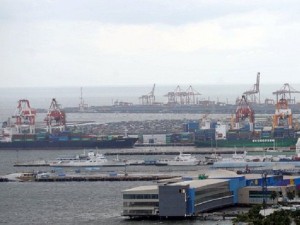
A photo of Manila South Harbor. The minimal exposure of the Philippines to external economic threats, the government said, is one of the factors that allow it to have an edge over its counterparts.
MANILA, Philippines—The country may have already earned for itself a unique spot on investors’ map as the Aquino administration highlights claims that the Philippines is much less vulnerable than other emerging economies to external shocks, such as the eurozone crisis.
The minimal exposure of the Philippines to external economic threats, the government said, is one of the factors that allow it to have an edge over its counterparts.
In a report posted online by the Investor Relations Office (IRO), the government said the Philippines fared better than many of its competitor countries in terms of ability to withstand shocks.
Citing data from the International Monetary Fund and the central bank, the IRO said that “trade openness” of the Philippines stands at about 38 percent, which is much less than that of many other developing and emerging economies.
Trade openness is the value of a country’s current account transactions, composed mostly of imports and exports, with the rest of the world as a percentage of its gross domestic product.
Trade openness levels of Taiwan, Thailand, and Malaysia, for instance, stand at much higher levels of 78, 81, and 92 percent, respectively, the IRO said.
Economists said a high level of trade openness could be good when the global economy appeared healthy, since it could help generate more export revenue for a country. But in tough times, or when the global economy is slowing down, a high level of trade openness could significantly dampen a country’s growth potential.
The Philippines has a much smaller level of trade openness than its counterparts because its economy is being driven largely by domestic demand, led by household spending, rather than exports.
With the crisis in the West far from being resolved, the IRO said, it now pays to do business in the Philippines.
In the first three quarters of the year, the Philippine economy grew by 6.5 percent, beating most projections and defying global growth trend.
Growth for the third quarter alone stood at 7.1 percent, the fastest in Southeast Asia during the period.
The IRO also said that the Philippines is becoming less dependent on the eurozone as far as trade is concerned because of efforts to seek alternative markets abroad.
Exports to the eurozone fell from 14.4 percent of the total in 2010 to 12.3 percent last year, the IRO said. Imports from Europe also dropped from 16.8 percent to 7.4 percent over the same period.
Given the capability of the Philippines to sustain robust growth even amid a global economic crunch, the government said, the country should eventually become a preferred site for foreign direct investments.

